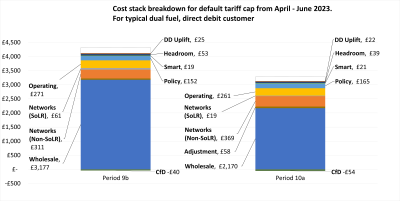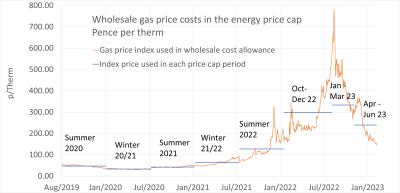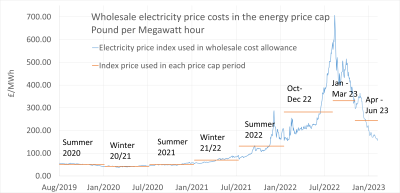Dyddiad cyhoeddi
Sector diwydiant
Energy regulator Ofgem has today (Monday 27 February 2023) announced its quarterly update to the energy price cap for the period 1 April – 30 June 2023.
From 1 April the energy price cap will be set at an annual level of £3,280 for a dual fuel household paying by direct debit based on typical consumption, a reduction of almost £1,000 from the current level, of £4,279 which reflects recent falls in wholesale energy prices.
The £3,280 figure indicates how much consumers on their energy suppliers' basic tariff would pay if the government’s Energy Price Guarantee (EPG) were not in place.
From 1 April, the government has set the EPG at £3,000 for the typical bill – meaning that consumers will not pay the full level of the energy price cap.
This reduction in the price cap level reflects a significant reduction in the cost of buying and providing energy for customers. If it continues, it will mean that by the summer, prices paid by consumers will drop for the first time since the global gas crisis took hold more than 18 months ago.
The energy price cap was introduced by the government and has been in place since January 2019, and Ofgem is required to regularly review the level at which it is set. It ensures that an energy supplier can recoup its efficient costs while making sure customers do not pay a higher amount for their energy than they should. The price cap, as set out in law, does this by setting a maximum that suppliers can charge per unit of energy.
Ofgem CEO Jonathan Brearley said:
“Although wholesale prices have fallen, the price cap has not yet fallen below the planned level of the Energy Price Guarantee. This means, that on current policy, bills will rise again in April. I know that, for many households this news will be deeply concerning.”
“However, today's announcement reflects the fundamental shift in the cost of wholesale energy for the first time since the gas crisis began, and while it won’t make an immediate difference to consumers, it’s a sign that some of the immense pressure we’ve seen in the energy markets over the last 18 months may be starting to ease. If the reduction in wholesale prices we’re currently seeing continues, the signs are positive that the price cap will fall again in the summer, potentially bringing bills significantly lower.”
“However, prices are unlikely to fall back to the level we saw before the energy crisis. Even with the extensive package of government support that is currently in place, this is a very tough time for many households across Britain.”
“Where people are struggling, we urge them to contact their supplier to make sure they are getting all the help and support they are entitled to. We also think that, with bills continuing to be so high, there is a case for examining with urgency the feasibility of a social tariff for customers in the most vulnerable situations.”
Ofgem has robust rules in place to help people in vulnerable situations, and suppliers are obliged to offer payment plans and direct customers to available support.
Bill-payers will continue to receive additional support via the EPG until the end of March 2024, as confirmed by the Chancellor on Thursday 17 November 2022. The level of this support is set by Government.
There is no immediate action for consumers to take as a result of today’s announcement.
Ofgem continues to protect consumers through its ongoing robust regulation of the market, taking enforcement action where necessary and providing support to those who need it the most.
The next quarterly price cap update will be on 25 May 2023.
NOTES TO EDITORS:
Please find updated number of customers on different tariff types as of December* 2022 below.
How many customers are on the various tariffs which impact the Price Cap?
- New no. of customers on SVTs – ‘around 27 million’
- New no. of SVT (non-PPM) customers – ‘around 24 million’
- New no. of SVT PPM customers – ‘around 4 million’
- Total number of customers on fixed tariffs 'around 4 million' (with the vast majority being non-PPM)
* Latest Financial Responsibility Principle RFI data is for Dec 22. Tariff and Customer Account RFI data is as of Jan 23 (used to calculate the SVT payment method splits).
The Energy Price Guarantee is a Government support measure to protect consumers with the level of support decided upon by Government.
Ofgem administers the scheme and publishes cap rates on a quarterly basis.
The tariff cap was legislated by government in order to protect default tariff customers (i.e. those on standard tariffs) from being overcharged. Price cap updates are currently published on a quarterly basis.
The price cap level is based on typical use for an average household and is a cap on energy unit price not a cap on total bills. For an individual customer, the amount they will pay varies depending on how much energy they use, where they live, and how they pay for their energy.
The methodology for setting the price cap is set out here and is regularly reviewed by Ofgem:
Section 5 sets out future price cap dates: Check if the energy price cap affects you | Ofgem
Published cap levels for the charge restriction period 10a of the default tariff cap: 1 April 2023 – 30 June 2023.
The price cap protects around 27 million customers on default or variable rates on credit meters. The £3,280 per year level of the cap is based on a household with typical consumption on a dual fuel electricity and gas bill paying by direct debit . The price cap is now updated on a quarterly basis. More information on this can be found on the "Ofgem confirms changes to the price cap methodology and frequency ahead of new rate to be announced later this month" press release.
For customers who pay by standard credit (cash or cheque) pay the default cap has decreased by £1051 from £4,533 to £3482 for typical dual fuel consumption. The additional costs reflect the higher cost for energy companies to serve them.
The 27 million customers protected by the price cap includes around 4 million prepayment meter (PPM) customers. The PPM level of the default cap has decreased by £1034 from £4,358 to £3325 for average dual fuel consumption. The additional costs for PPM customers reflects the higher cost for energy companies to serve them. For electricity only customers on Economy 7 paying by Direct Debit has decreased by £695 from £2,988 to £2,282 for typical consumption (4,200 kWh).
The values shown in the text above include VAT and are expressed for the current Typical Domestic Consumption Values (TDCV) of 2,900kWh of electricity, 12,000kWh of gas, and 4,200kWh of electricity for Economy 7.
The price cap is a cap on a unit of gas and electricity, with standing charges taken into account. It is not a cap on customers’ overall energy bills, which will still rise or fall in line with their energy consumption. From 1 April the equivalent per unit level of the price cap to the nearest pence for a typical customer paying by direct debit will be 51p per kWh for electricity customers and a standing charge of 53p per day. The equivalent per unit level for a typical electricity muti-register customer is 50p per kWh and with a standing charge of 53p per day. The equivalent per unit level for a typical gas customer is 13p per kWh with a standing charge of 29p per day.
Breakdown of costs in the energy price cap
Dual fuel customer paying by direct debit, typical energy use (GB £) £3,280
The charts below shows indexed wholesale prices from cap period 9b (Jan – March 23) to cap period 10a (April - June 2023). Wholesale costs make up the majority of a customer’s bill.
Prior to October 2022 update – we observed wholesale prices for future delivery over an indexation period. This was carried out twice a year, from the preceding February to August for the winter period (October - March) and from September to January for the summer period (April - September). The fixed horizontal lines show the average wholesale cost allowance for each 6 month price cap period based on the price of the relevant forward looking energy contracts (the jagged line).
From October 2022 to March 2023, as set out in our 4 August decision document, the wholesale allowance calculated within the price cap uses a transitional approach to price indexation compared to previous periods as such they are not directly comparable.
From April 2022 we have determined the wholesale cost allowance within the price cap four times a year, based on the price of the forward-looking energy contracts over the previous three months.
The fixed horizontal line representing the November update, April - June 2023, shows a weighted average wholesale cost allowance for the 3 month price cap period based on the price of the relevant forward looking energy contracts and number of observed trading days (the jagged line).
Wholesale gas price costs in the energy price cap
Wholesale electricity price costs in the energy price cap
Data sets behind these graphs are proprietary and can be sourced from ICIS.
Current government support available for consumers:
- Energy Bills Support Scheme: millions of households across Great Britain will receive a £400 non-repayable discount on their energy bills from October this winter.
- Warm Homes Discount: a £150 Warm Homes Discount will also begin to be paid to 3million low-income households from October.
- Households most in need will be eligible for further support in addition to the Energy Bills discount. This includes:
- £650 one-off Cost of Living Payment for around 8 million households on means tested benefits
- A one-off £300 Pensioner Cost of Living Payment for over 8 million pensioner households to be paid alongside the Winter Fuel Payment
- A payment of £150 for around six million people across the UK who receive certain disability benefits
- A £500 million increase and extension of the Household Support Fund.
Information and materials for consumers about the price caps is available at: www.ofgem.gov.uk/energy-price-caps. Information on support and advice for consumers worried about paying their bills is available at: http://www.ofgem.gov.uk/help-with-bills
For all other non-media related enquiries, please visit our Contact us page.


